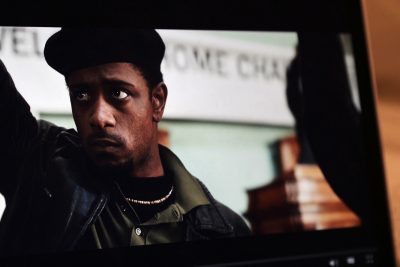Fred Hampton, deputy chairman of the Illinois chapter of the revolutionary Black Panther Party and alleged national security threat to the United States, was assassinated by Chicago police in 1969.

He was 21 years old.
Hampton’s story — largely overlooked in history, along with many Black Panther members — is about an empowered man who united poor and working class individuals from all races under the Rainbow Coalition.
Warner Bros. hosted a college roundtable for the film “Judas and the Black Messiah” on Zoom Saturday, where student journalists across the country could watch the film and then interview four of the stars.
The film “Judas and the Black Messiah,” directed and co-written by Shaka King, is bringing his story to light.
Premiering in theaters Friday, the film has been recognized for multiple awards, including the 2021 AFI award for Movie of the Year and a Black Film Critics Circle Awards nomination for best picture.
Daniel Kaluuya, star of the 2017 thriller “Get Out,” plays Hampton in the upcoming biopic. He said at a roundtable discussion he couldn’t believe how young Hampton when he accomplished everything he did.
“He can’t have been 21,” Kaluuya said. “Not only because he was assassinated at 21, but also, he made it to chairman of the Black Panther Party at 21. I was like, ‘Well, who is this guy?’”
Kaluuya, whose performance secured him a Golden Globe nomination for Best Supporting Actor this year, said the activist’s story inspired him to go on a “deep dive” of Hampton’s fascinating history before playing the part.
He said he was particularly moved by the activist’s speeches.
“That’s what resonated with me,” he said. “Watching the speeches, I just wanted to move others how I felt moved by him watching his speech. If I sit in that energetic spiritual space … that’s the intensity I needed to exude.”
Kaluuya said he strived to layer Hampton’s “emotional urgency” into his performance to properly exemplify the gifted orator’s life.
“For me, it was understanding the stakes and how he cared,” Kaluuya said. “I think there was probably a subconscious knowing his time was limited … so he needed people to hear this s— ASAP.”
The film depicts some of the work Hampton did — giving compelling speeches and speaking with different ethnic, racial and socio-economic groups to join the movement.
Starring opposite Kaluuya in the film is LaKeith Stanfield, known for his role in 2018’s “Sorry to Bother You.” Stanfield plays William “Bill” O’Neal, a car thief who infiltrated the Black Panther Party as an FBI informant — a position he worked in order to avoid legal punishment.
Stanfield said his “Judas” character has a complex history.
O’Neal was a teenager when the FBI coerced him into consultantship. In the movie, his final act as an informant was drugging Hampton on the night of a police raid, so the Chicago Police Department could kill him when he was passed out.
“The villain is the U.S. government, the FBI,” Stanfield said at the roundtable. “Yes, he’s kind of a victim to a circumstance, but also he had a choice to make.”
He said the character’s young age allowed him the unique opportunity to show the nuances of being Black in the United States.
“There’s some people that just want to get money … they just want to thrive and survive in the society that they’re in,” Stanfield said. “It was unique in that sense and put me into a place or space where I had to challenge my own self and be like ‘It’s okay to have aspirations outside of either Black liberation or complete complacency.’”
Twenty-five days after Hampton was assassinated, his son, Fred Hampton Jr., was born to Deborah Johnson, now known as Akua Njeri.
Njeir was played by Dominique Fishback, who brought emotional moments to a film full of violence and police brutality. She said playing “Mama Akua,” as she called her, was “an honor.”
“I think about the fact that Mama Akua is still here,” Fishback said, “and this is a life she had to live and memories she has to hold on to.”
Kaluuya said this movie is particularly moving because it speaks to the emotions of people navigating racial injustices today.
“This film articulates and shows strategies and blueprints of what a lot of people are feeling right now,” he said, “not necessarily the film, but what Chairman Fred and the Black Panther Party actually did.”
Kaluuya added that those called to action because of the killings of Breonna Taylor and George Floyd can look at this movie and history as an example of change and personal action.
“I think we have this tendency to try and change the world,” he said, “but when you change your world, the world sorts itself out, I personally believe.”





















































































































